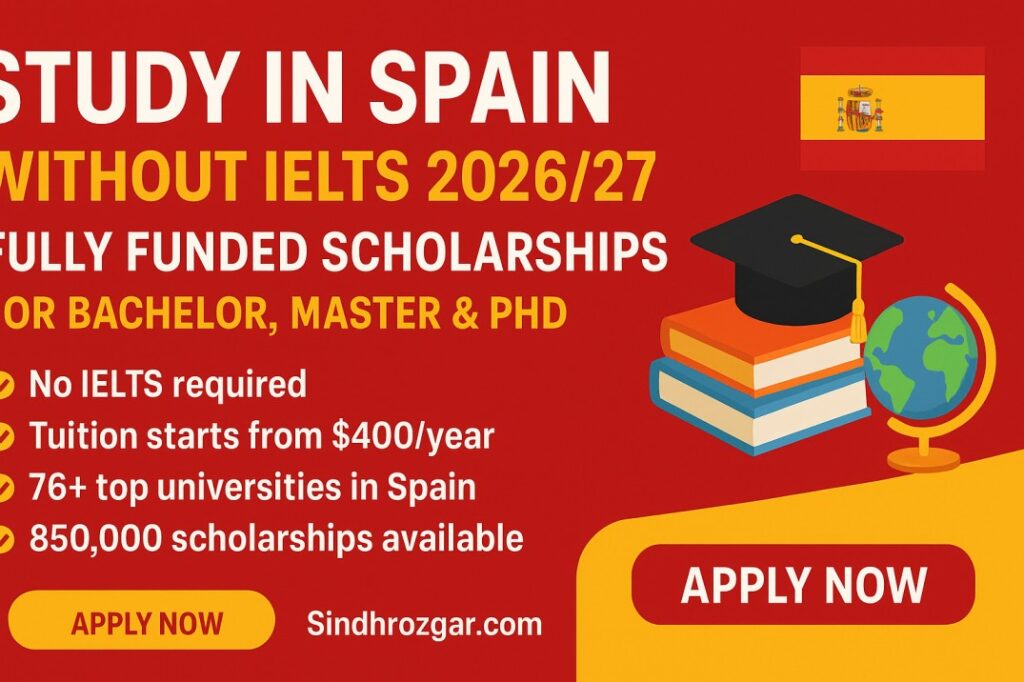Study in Spain Without IELTS 2026/27 – Fully Funded Scholarships for International Students
Focus keyword: Study in Spain Without IELTS 2026/27
Study in Spain Without IELTS 2026/27 is an increasingly viable path for international students who want access to affordable, high-quality higher education in Europe. Spain offers a wide range of scholarship options — government-funded, university-level, and external grants — that often accept alternatives to IELTS such as Medium of Instruction (MOI) certificates or university language tests.
In this comprehensive guide we cover background, benefits, risks, step-by-step application guidance, top universities, cost estimates, case studies, FAQs, and the exact documents you’ll need to apply for scholarships and admissions for the academic year 2026/27.
Why Spain? Background & context
Spain has long been a major hub for higher education in Europe. With an extensive network of public and private institutions, Spain offers a broad selection of English-taught programs, especially at Masters and PhD levels. In recent years, universities and government bodies have moved to reduce language barriers and streamline admissions for international applicants.
Several Spanish universities now accept alternatives to IELTS. This shift boosts accessibility for students from regions where attaining IELTS is costly, time-consuming, or logistically difficult.
Top reasons to choose Spain for 2026/27
- Affordability: Public university tuition often ranges from low hundreds to a few thousand dollars per year.
- Quality: Spanish institutions rank highly for research, arts, engineering and business programs.
- Cultural experience: Spain offers vibrant student life, historical cities, and strong international networks.
- Work options: Students can work part-time (usually up to 20 hours/week).
- Mobility: Spain is part of the EU — opportunities for internships and European exchange programs (e.g., Erasmus).
Top universities in Spain that often waive IELTS
Many universities accept MOI or their internal tests. Examples include:
- Universidad Antonio de Nebrija
- University of Salamanca
- Pablo de Olavide University
- University of Valencia
- Universidad Autónoma de Madrid
- Universitat de Barcelona
Who qualifies for an IELTS waiver?
Common waiver scenarios:
- Applicants with a degree taught fully in English (MOI certificate).
- Students from majority-English-speaking countries (varies by university).
- Applicants passing a university-specific language test or interview.
- Those with alternative standardized tests (TOEFL, Cambridge, Duolingo — if accepted).
Documents required: Checklist
Prepare these documents early to strengthen your application:
- Completed online application form.
- Official academic transcripts (translated if necessary).
- Proof of English proficiency — MOI certificate or university test results.
- Curriculum Vitae (CV) or Resume.
- Statement of Purpose (SOP) or Motivation Letter.
- Two to three Recommendation Letters.
- Copy of passport and passport-size photographs.
- Health insurance documentation and financial proof (bank statements or sponsor letter).
Tuition, living costs & financial planning
Estimated costs (annual):
- Tuition: Public: $400–$3,000; Private: $3,000–$15,000 depending on program and institution.
- Accommodation: Shared flat: $300–$600; Student dorms: $200–$450.
- Living expenses: $800–$1,500/month (food, transport, utilities).
- Health insurance: $200–$700/year (varies by plan).
Tip: Apply for scholarships AND part-time work to cover living costs. Many students combine both.
Types of scholarships and funding sources
Scholarships come from several channels:
1. Government scholarships
Examples include:
- Spanish Ministry of Education scholarships
- MAEC-AECID scholarships for students from developing countries
- Erasmus+ and Erasmus Mundus joint programs
2. University scholarships
Universities often provide merit-based, need-based or faculty-specific grants. Check each university’s scholarships page for details and deadlines.
3. External & private scholarships
Sponsors like Santander, regional trusts, or bilateral agreements may provide additional funding. Research foundation grants in your home country as well.
How to apply — step-by-step (timeline & tips)
- Research programs early: List universities, eligibility, deadlines (start 8–12 months before the intake).
- Confirm language requirements: Verify whether MOI, university test, or alternate tests are accepted.
- Prepare documents: Get transcripts, MOI, SOP, CV, and references ready.
- Apply for admission: Use university portals or centralized application systems.
- Apply for scholarships: Submit scholarship forms along with admission application if required.
- Accept offer & visa: After admission, obtain acceptance letter, then apply for a student visa (TIE/NIE processes after arrival).
Visa & post-arrival essentials
Key visa steps:
- Obtain an official acceptance letter and proof of funds.
- Apply for a Spanish student visa at the nearest consulate (appointment-based).
- Upon arrival, register at local authorities (empadronamiento) and apply for TIE (residence card).
Work opportunities & post-study paths
Students on a valid TIE can commonly work part-time (often up to 20 hours/week). Post-graduation, Spain offers pathways to work permits — especially for graduates in high-demand sectors like IT, engineering, healthcare, and research.
Real student case study
Case: Maria (India) applied to University of Salamanca for a Master’s in Data Science. She provided an MOI certificate from her BSc, a strong SOP, and two recommendation letters.
Outcome: Maria received a university merit scholarship covering tuition and a partial living stipend. She completed an internship through university ties and later obtained a job offer in Madrid. Her path demonstrates how MOI + strong application can lead to funded opportunities.
Risks, limitations & how to mitigate them
Common challenges:
- Competition: Fully funded scholarships are limited and competitive.
- Language mismatch: Some undergraduate programs are primarily in Spanish — learn basics.
- Visa delays: Start consulate processes early and prepare complete documentation.
Mitigation:
- Apply to multiple programs and funding sources.
- Get your documents verified and translated ahead of time.
- Network with alumni and university admissions staff for application tips.
LSI & Related Keywords (for semantic SEO)
Spain scholarships, study abroad Spain, MOI certificate Spain, universities in Spain 2026, Erasmus Spain, Spanish government scholarships, study in Europe without IELTS, Masters in Spain without IELTS
Internal & External Links (publish-ready suggestions)
Internal links (example):
External authority links (example):
- Spanish Ministry of Education
- Erasmus+ (European Commission)
- Universities in Spain – official listings
Frequently Asked Questions (FAQs)
Q: Can I study in Spain without IELTS in 2026/27?
A: Yes — many universities accept a Medium of Instruction (MOI) certificate, internal university tests, or alternate tests like TOEFL or Duolingo.
Q: How much do fully funded scholarships cover?
A: Coverage varies: some scholarships cover tuition only; others include tuition, accommodation allowance and living stipend. Always check scholarship terms.
Q: How early should I apply?
A: Start 8–12 months ahead of the intake: research programs, prepare documents, and submit both admission and scholarship applications before deadlines.
Q: Do I need to know Spanish?
A: Not always — many Masters and PhD programs are in English. Still, basic Spanish helps daily life and improves employment opportunities.
Q: Can I work while studying?
A: Yes. Part-time work is permitted (commonly 20 hours/week), subject to visa conditions.
Conclusion & Strong Call to Action
Spain offers a compelling mix of affordability, academic excellence, and cultural richness — and for 2026/27 many universities are waiving IELTS by accepting MOI or internal tests. Fully funded scholarships exist but are competitive.
Ready to apply? Start now: research programs, secure your MOI or alternative proof of English, prepare a standout SOP, and apply early for scholarships.

